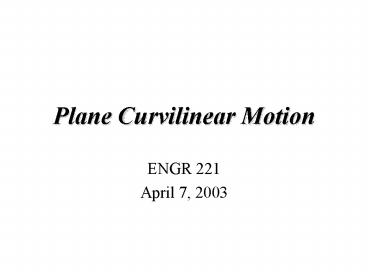Plane Curvilinear Motion - PowerPoint PPT Presentation
1 / 34
Title:
Plane Curvilinear Motion
Description:
... 2-D rectangular coordinates, the location, velocity and acceleration can be ... Substitute for the time and the location of 2000 ft. ... – PowerPoint PPT presentation
Number of Views:417
Avg rating:3.0/5.0
Title: Plane Curvilinear Motion
1
Plane Curvilinear Motion
- ENGR 221
- April 7, 2003
2
Lecture Goals
- Rectangular Coordinates
- Polar Coordinates
- Normal and Tangential Coordinates
3
Rectangular Coordinates
Using 2-D rectangular coordinates, the location,
velocity and acceleration can be represented in
Cartesian form of equation. A change in the
vector, displacement is represented as
4
Rectangular Coordinates
The velocity component is represented by The
acceleration by
5
Example Problem Rectangular systems
A projectile is fired with an initial velocity
of 800 ft/s at a target B located 2000 ft above
the gun A and at a horizontal distance of 12000
ft. Neglect air resistance, determine the value
of the firing angle a.
6
Example Problem Rectangular systems
Break the problem into horizontal and vertical
components. The horizontal velocity is
7
Example Problem Rectangular systems
The distance traveled will be 12000 ft. So the
time can be found
8
Example Problem Rectangular systems
The vertical components of the equation are
9
Example Problem Rectangular systems
Substitute for the time and the location of 2000
ft.
Use the substitute that 1/cos2 a sec2 a 1
tan2 a
10
Example Problem Rectangular systems
Rearrange the equation
Solve the quadratic tan a 0.565 and tan a
2.75
11
Example Problem Rectangular systems
The solution will be a 29.5o and a 70.0o,
either angle will reach the target
12
Class Problem Rectangular systems
A player throws a ball with an initial velocity
v0 of 50 ft/s from a point A located 5 ft above
the floor. Knowing that the ceiling of the
gymnasium is 20 ft high, determine the highest
point B at which the ball can strike the wall 60
ft. away.
13
Polar Coordinates
Using 2-D rectangular coordinates, the location,
velocity and acceleration can be related to point
with angle and radius. So the particle location
is given as where, O is the location of the
reference point.
14
Polar Coordinates
The velocity component is represented by The
vector displacement can be represented as
15
Polar Coordinates
The vector component can be represented
as Back substitute
16
Polar Coordinates
The velocity component are written as
Alternative representation of the vectors is
using Cartesian coordinates.
17
Polar Coordinates
Take the derivative of the vector components with
respect to q
18
Polar Coordinates
The acceleration can be written as
19
Polar Coordinates
The rearrange the acceleration if r is
constant
20
Example Problem Polar systems
The rotation of 3 ft arm OA about O is defined by
the relation q 0.15t2, where q is expressed in
radians and t in seconds. Block B slides along
the arm in such a way that it distance from O is
r 3 0.4 t2, where r is expressed in ft and t
in seconds. Determine the total velocity and
total acceleration of block B after the arm OA
has rotated 30o
21
Example Problem Polar systems
Find out when q 30o occurs
22
Example Problem Polar systems
Take the time derivatives of r and q
23
Example Problem Polar systems
The velocity components are
24
Example Problem Polar systems
The velocity components are The v 1.744
ft/s and b 31.0o
25
Example Problem Polar systems
The acceleration components are
26
Example Problem Polar systems
The velocity components are
27
Example Problem Polar systems
The velocity components are The a 1.770
ft/s2 and g 42.5o
28
Class Problem
Determine the velocity of the rocket and
acceleration in terms of
29
Tangential Coordinates
Using 2-D rectangular coordinates, the location,
velocity and acceleration can be related to the
path of the particle radius. So the particle
path is s(t), the velocity along the path is
tangent to the instant in time.
30
Tangential Coordinates
The acceleration component is represented by
The vector can be represented as
31
Polar Coordinates
The vector component can be represented as
32
Tangential Coordinates
The acceleration component is represented by
33
Polar Coordinates
The rearrange the acceleration if r is
constant
34
Homework (Due 4/14/03)
Problems
13-103, 13-109,13-106, 13-112ab (not c)

